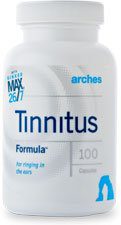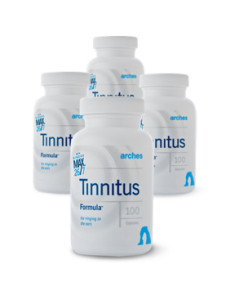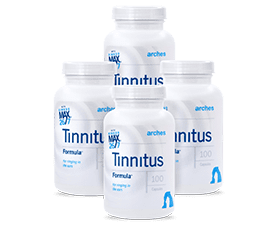 Editor’s Note: Over the years, Arches has received encouraging and positive feedback from many Ear, Nose & Throat doctors who recommend Arches Tinnitus Formula® (ATF) to their patients with tinnitus. A consensus among referring physicians agreed that they saw a positive response rate of 65-80% when specifically selecting patients with tinnitus due to sensorineural hearing loss (the largest tinnitus population). We were interested to see if this outstanding success rate could be duplicated in a clinical setting. So under the auspices of a board certified Otolaryngologist and a doctor of Audiology we began our first observational clinical study on ATF.
Editor’s Note: Over the years, Arches has received encouraging and positive feedback from many Ear, Nose & Throat doctors who recommend Arches Tinnitus Formula® (ATF) to their patients with tinnitus. A consensus among referring physicians agreed that they saw a positive response rate of 65-80% when specifically selecting patients with tinnitus due to sensorineural hearing loss (the largest tinnitus population). We were interested to see if this outstanding success rate could be duplicated in a clinical setting. So under the auspices of a board certified Otolaryngologist and a doctor of Audiology we began our first observational clinical study on ATF.
Abstract
Several studies have been conducted on the effectiveness of Ginkgo biloba and zinc for reducing tinnitus symptoms. Most of these studies have shown positive outcomes. However, the majority of dietary supplements marketed for tinnitus symptoms – regardless of the formula – lack any studies. Arches Natural Products, Inc. (Arches) conducted this initial study as the first in a small series of medical practitioner-based studies across the USA. This study was conducted on the effectiveness of Arches Tinnitus Formula® (ATF), which contains these ingredients plus odor-controlled garlic, for reducing tinnitus symptoms. In this small, observational study, fifteen participants were enrolled and treated with ATF, although only nine completed the study. They filled out Tinnitus Handicap Inventories (THI) both before and after a three-month treatment period. At the end of the study, six patients out of nine (66.66%) showed improvement. The degree of improvement averaged 10.33 points, which was equivalent of an average improvement of 35.22%.
Background
ATF is a dietary supplement produced in the USA and marketed by Utah-based Arches. Their products are sold directly to patients and highly leverage medical practitioner referrals and recommendations. Arches is the owner of all US registered trademarks for the final product and their proprietary, highest concentration Ginkgo biloba product available. All production – from raw materials to finished products – are manufactured under cGMP and NSF-certified standards. Finished products are tested, monitored and audited to ensure complete compliance with all safety and quality standards.
Previous studies have, for the most part, shown significant improvement in tinnitus with the use of the special Ginkgo biloba extract EGb 761 (Dr. Willmar Schwabe GmbH & Co. KG Pharmaceuticals, Karlsruhe, Germany).
The German Commission E is a scientific advisory board to the German government and is the equivalent of the US Food and Drug Administration. It provides scientific expertise for the approval of substances and products previously used in traditional, folk and herbal medicine. The commission is considered the world’s foremost authority on herbal therapies. It has published 380 monographs evaluating the safety and efficacy of herbs for medical practice in Germany. (1) In the monograph for Ginkgo biloba, the commission has defined the extract EGb 761 and approved Ginkgo biloba for the treatment of tinnitus in a dosage of 480 mg per day.
Norbert Holstein, MD, conducted a systematic overview of 19 clinical studies for the use of Ginkgo biloba extract for tinnitus treatment. Included were eight controlled studies which showed statistically significant improvement compared to placebo or reference drugs. Open studies with large numbers of patients also revealed appreciable improvements using ginkgo treatment. There were 3,931 patients involved in all the studies and results were conclusive. (2) The author stated, “Therapeutic success was not directly correlated with either the genesis or the duration of tinnitus. However, investigations of prognostic factors revealed that short-standing disorders have a better prognosis, so that better results can be expected from early-onset treatment. The tolerability of Ginkgo biloba special extract EGb 761 was excellent, and in this respect the controlled clinical trials revealed little difference between drug-treated and control groups.”
Alexander von Boetticher, MD conducted another overview of clinical studies for ginkgo’s effect on tinnitus. In this overview, all studies were randomized, placebo-controlled clinical trials. The Holstein overview, above, was one of the included trials. There were eight trials included in his review. Von Boetticher limited his review to studies that used only the standardized extract EGb 761, as there are other ginkgo products on the market which are not well described or standardized. (3)
Von Boetticher concludes, “…the currently available literature shows that there is evidence for the successful treatment of tinnitus with the Ginkgo biloba extract, EGb 761. Of note, all trials using this extract consistently demonstrate its superiority over placebo.” And, “Considering the limited data from methodologically sound, well controlled trials of other therapeutic options, the robust and consistent data available for tinnitus treatment with EGb 761 should be appreciated.”
There is a clinical trial of ginkgo that did not show efficacy and that skeptics point to in an attempt to discredit ginkgo extract. This is the study by Drew and Davies, commonly referred to as the Birmingham study, after the city in which it was conducted. (4) Von Boetticher has this to say about the study:
“In a randomized, double-blind, placebo-controlled trial reported by Drew and Davies, 1243 patients with chronic tinnitus were enrolled and treated with LI 1370, 150 mg per day or placebo for 12 weeks. This study did not meet minimal standards of Good Clinical Practice. No personal contact between physicians and patients was required; as a consequence, the actual existence and identity of the patients could not be verified, nor was any medical or audiological examination performed…” Based on the limits of this study and the totality of evidence across many other studies of Ginkgo biloba, our conclusion is that the preponderance of evidence supports the conclusion that Ginkgo biloba is effective in addressing tinnitus symptoms.
A study on the effectiveness of zinc for tinnitus was conducted in Ankara, Turkey. The study was a randomized, placebo-controlled study. Patients were given 50 mg of zinc daily for two months. Each patient was given a questionnaire on which they scored their subjective tinnitus intensity both before and after the two month treatment. The questionnaire used an intensity scale between 0 and 7. (5)
At the end of treatment, the severity of subjective tinnitus decreased in 82% of the patients receiving zinc. The mean of subjective tinnitus decreased from 5.25 to 2.82, a 46.3% decline.
Methods and Materials
Fifteen patients were recruited through the office of Robert Hartenstein, AuD, a doctor of Audiology running Audiology Associates, Inc. in Rutland, Vermont, in collaboration with Anders Holm, MD, and Kristopher Anderson, MD both Ear, Nose and Throat physicians. The testing was conducted at Audiology Associates, Inc. from May 2014 to April 2015.
All patients were subjected to a medical evaluation to rule out potential medical conditions that could cause or interfere with their tinnitus. The object was to limit the study to tinnitus patients who had associated tinnitus and hearing loss. It is widely understood that up to 90% of tinnitus cases occur with hearing loss. (6)
Patients were also subjected to an audiological examination. This was to further determine that the patients did indeed suffer from hearing loss and the loss was most likely the cause of the tinnitus.
All patients were administered the Tinnitus Handicap Inventory. This is a 25-question test that Ear, Nose & Throat physicians and Audiologists use  to determine the degree of distress suffered by the tinnitus patient. It is widely used in clinical trials to determine the effectiveness of a given therapy.
to determine the degree of distress suffered by the tinnitus patient. It is widely used in clinical trials to determine the effectiveness of a given therapy.
After the patients filled out the questionnaire, they were given a 100-day supply (4 bottles) of Arches Tinnitus Formula and sent home with instructions to take two capsules twice daily for the 100 days and return to the clinic at the end of that time for further evaluation.
Six patients were non-compliant in using the formula and were not included in the results. Nine patients used the formula as instructed and filled out the THI again for comparison with the first questionnaire.
Of the 9 patients who were compliant and filled out both questionnaires, 6 had a reduction in the THI score. The amounts of reduction ranged from a minimum of 4 points for 2 patients, 12 points for 1 patient and 14 points for 3 patients. The average reduction was 10.33 points, a statistically significant outcome. The average percentage of improvement was 35.22%, also clinically significant.
Discussion
Arches Tinnitus Formula contains the ingredients listed below. These ingredients work synergistically to improve blood flow in the inner ear, provide antioxidant protection against free radicals generated by neuronal hyperactivity and to provide glutamate antagonism and neuroprotection in the cochlea. Glutamate is an excitatory neurotransmitter and excess glutamate is released when cochlear hair cells are damaged. This causes excess synaptic firing and damages the neuroreceptors in the auditory pathway. (7)
Ginkgo biloba has long been accepted in Europe to be helpful for tinnitus. It was developed by the Dr. Willmar Schwabe Company in Germany and is the most studied herb in the world. There have been over 400 scientific studies on the effectiveness of Ginkgo biloba for many conditions.
Ginkgo has been very popular in Europe and more recently in the US. It is praised for its neuroprotective properties and its ability to aid in circulatory problems in the elderly, especially cerebral insufficiency and the associated cognitive effects, peripheral circulatory impairment (poor circulation to the lower legs), vertigo and tinnitus. (8)
The greatest concentration of zinc in the body is in the cochlea and auditory pathway. Evidence in the literature suggests zinc deficiency occurs in people with tinnitus ranging up to 69%, affecting older individuals more frequently. Other studies have also suggested that administration of oral zinc has a beneficial effect on tinnitus. (9)
Garlic helps lower cholesterol, which can build up in the artery leading to the cochlea and reduce circulation. It also helps thin the blood and increases the delivery of nutrients to the inner ear. (10)
Arches undertook the study in collaboration with Drs. Holm and Hartenstein to build specific evidence on the effectiveness of ATF. The US dietary supplement market, in general, suffers from a lack of studies on individual products. This problem is just as severe for dietary supplements, OTC and homeopathic products targeting tinnitus symptoms. This is intended as the first in a series of collaborative studies with partner medical practitioners to study the efficaciousness of ATF. Arches is actively seeking more medical practitioners for study collaboration.
In 2015 Arches Natural Products, Inc., the manufacturer of Arches Tinnitus Formula, received trademark protection from the US Patent and Trademark Office for a new, more highly purified and concentrated Ginkgo biloba extract. The product is branded as Ginkgo Max 26/7® and it increases the amounts of the active ingredients in the standardized extract. Most importantly, it increases the amount of Bilobalide, the fraction responsible for glutamate antagonism and neuroprotection, by 40% from the standardized extract.
This small study included only 9 people but, of those, 6 had improvement in tinnitus. More and larger studies need to be done to confirm Arches Tinnitus Formula as an effective way to reduce tinnitus symptoms. Physicians and clinics that would like to add more participants to this ongoing study and expand the database are invited to contact the manufacturer to discuss their involvement.
References:
1 – The Complete German Commission E Monographs, Therapeutic Guide to Herbal Medicines, American Botanical Council (1998), Mark Blumenthal, editor.
2 – Holstein N. Ginkgo special extract EGb 761 in tinnitus therapy: An overview of results of completed clinical trials. Fortschr Med Orig. 2001 Jan 11,118(4):157-64.
3 – Alexander von Boetticher, Ginkgo biloba extract in the treatment of tinnitus; a systematic review. Neuropsychiatr Dis Treat. 2011;7:441-447.
4 – Drew S, Davies E. Effectiveness of Ginkgo biloba in treating tinnitus; double-blind, placebo controlled trial. BMJ. 2001;322(7278):1-6
5 – Arda HN, Tuncel U, Akdogin O, Ozluoglu L. Role of zinc in the treatment of tinnitus. Otol Neurotol. 2003 Jan;24(1):86-9.
6 – Hearing Health Foundation, http://hearinghealthfoundation.org/statistics. Accessed 8/5/15.
7 – Arches Natural Products, Inc. https://www.tinnitusformula.com/library/the-science-behind-the-product/.
8 – American Botanical Council, http://cms.herbalgram.org/expandedE/GinkgoBilobaleafextract.html?ts=1438972271&signature=a8d2bcf791a498a285657c7c0c0b5ddd. Accessed 8/7/15.
9 – Coelho CB, Tyler R. Hansen M. Zinc as a possible treatment for tinnitus. Prog Brain Res. 2007;166:279-85.
10 – Yeh YY, Liu L. Cholesterol lowering effects of garlic extracts and organosulphur compounds: human and animal studies. J Nutr. 2001 March;131(3s):989s-93s.
- 6 of 9 tinnitus sufferers showed improvement with Arches Tinnitus formula
- More participants may be added to this ongoing study.
Get Free Shipping!
Order now and get free shipping on either the Tinnitus Starter Kit or Combo Pack. Try the doctor recommended products with clinically proven ingredients for tinnitus. No coupon code required.

